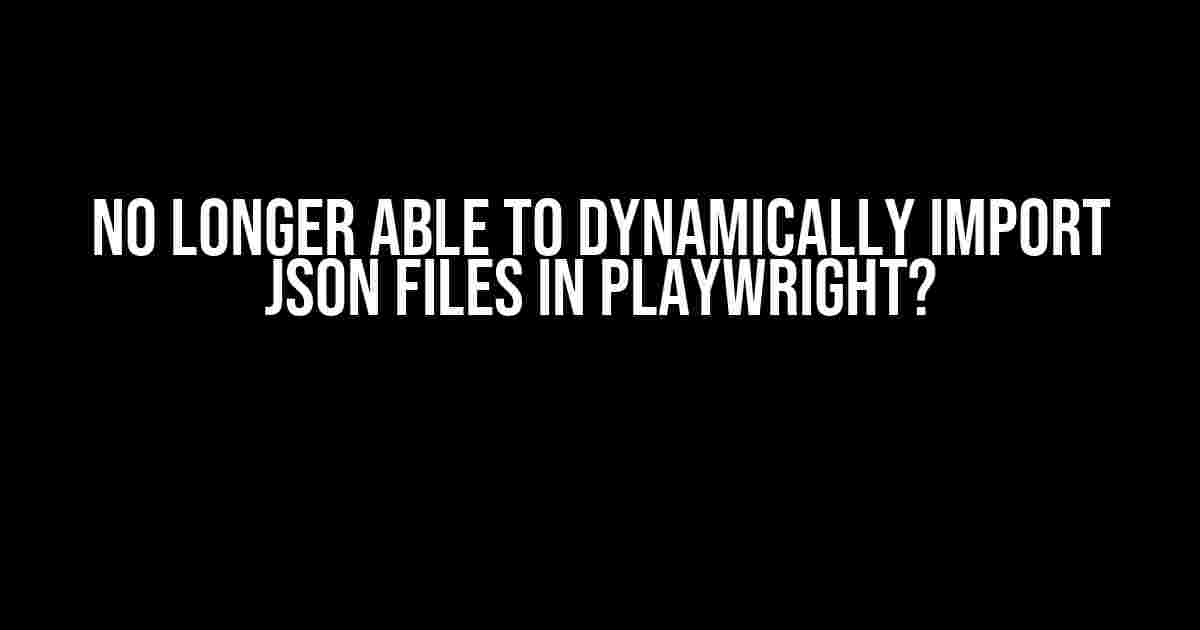If you’re reading this, chances are you’re stuck trying to dynamically import JSON files in Playwright. Well, you’re not alone! Playwright, the popular browser automation framework, has made some changes that might have broken your precious JSON imports. But fear not, dear developer, for we’ve got you covered.
What’s the Issue?
Previously, Playwright allowed you to dynamically import JSON files using the `require` function. You could simply do something like this:
const jsonData = require(`./path/to/data/${filename}.json`);But, as of Playwright 1.19.0, this approach no longer works. The error message you’ll see is something like:
Error: Cannot find module './path/to/data/${filename}.json'Why Did Playwright Change This?
According to the Playwright team, this change was made to improve security and prevent arbitrary file access. By disallowing dynamic `require`s, they’re mitigating the risk of malicious code being executed.
So, What’s the Workaround?
Fear not, dear developer, for there’s a solution to this problem! You can use the `fs` module to read the JSON file and then parse it manually. Here’s an example:
const fs = require('fs');
const path = require('path');
async function importJson(filename) {
const filePath = path.resolve(`./path/to/data/${filename}.json`);
const rawData = await fs.promises.readFile(filePath, 'utf8');
return JSON.parse(rawData);
}
const jsonData = await importJson('data');
console.log(jsonData);Note that we’re using the `fs.promises` API to read the file asynchronously. This is because Playwright is built on top of Node.js, which supports async/await syntax.
But What About Browser Context?
You might be wondering, “What about browser context? I need to import JSON files within a browser context!”
Fear not, dear developer, for we’ve got you covered again! You can use the `page.evaluate` method to execute a script in the browser context, which can then import the JSON file. Here’s an example:
const playwright = require('playwright');
(async () => {
const browser = await playwright.chromium.launch();
const context = await browser.newContext();
const page = await context.newPage();
async function importJson(filename) {
const data = await page.evaluate((filename) => {
const filePath = `/path/to/data/${filename}.json`;
const rawData = await fetch(filePath).then((res) => res.text());
return JSON.parse(rawData);
}, filename);
return data;
}
const jsonData = await importJson('data');
console.log(jsonData);
await browser.close();
})();Note that we’re using `page.evaluate` to execute a script in the browser context, which fetches the JSON file and parses it. The parsed data is then returned to the Node.js context.
Other Options?
While the above workarounds should get you up and running, you might be wondering if there are other options available.
Playwright’s `load` Method
Playwright provides a `load` method on the `context` object, which allows you to load a JSON file. However, this method only works for JSON files that are part of your project, and not for dynamically generated files.
const context = await browser.newContext();
const data = await context.load('/path/to/data/data.json');
console.log(data);Using a Bundler
If you’re using a bundler like Webpack or Rollup, you can configure it to include your JSON files in the bundle. This way, you can import the JSON files as modules.
Troubleshooting Tips
While implementing the workarounds above, you might encounter some errors. Here are some troubleshooting tips to keep in mind:
- Check your file paths**: Make sure your file paths are correct and relative to the correct directory.
- Verify file existence**: Ensure that the JSON file you’re trying to import exists in the specified location.
- Use the correct JSON parsing method**: Depending on your use case, you might need to use `JSON.parse()` or `await page.content()` to parse the JSON data.
Conclusion
And there you have it, dear developer! With these workarounds and troubleshooting tips, you should be able to dynamically import JSON files in Playwright once again.
Remember, the Playwright team made this change to improve security, so it’s essential to adapt to these changes and use the recommended approaches to ensure the security and integrity of your code.
Happy coding, and if you have any more questions or need further assistance, don’t hesitate to ask!
| Playwright Version | JSON Import Method |
|---|---|
| < 1.19.0 | Dynamic `require` |
| ≥ 1.19.0 | `fs` module or `page.evaluate` |
Stay tuned for more Playwright-related articles and tutorials!
Frequently Asked Question
Having trouble with dynamically importing JSON files in Playwright? Don’t worry, we’ve got you covered!
Why can’t I dynamically import JSON files in Playwright?
Starting from Playwright 1.20, JSON files are no longer allowed to be dynamically imported due to security concerns. This change was made to prevent potential security vulnerabilities in the browser context.
What’s the alternative to dynamically importing JSON files?
Instead of importing JSON files dynamically, you can use the `context.addInitScript` method to inject the JSON data into the page context. This allows you to load the JSON data in a secure and controlled manner.
How do I load JSON data using `context.addInitScript`?
You can load JSON data using `context.addInitScript` by injecting a script that sets a global variable with the JSON data. For example: `await context.addInitScript(() => { window.myData = { /* your JSON data */ }; });`.
Can I still use require to import JSON files in Node.js context?
Yes, you can still use `require` to import JSON files in the Node.js context, but keep in mind that this will only work for local files and not in the browser context.
What if I’m stuck with an older version of Playwright?
If you’re stuck with an older version of Playwright that still allows dynamic JSON imports, be aware that this is a security risk and you should consider upgrading to a newer version of Playwright as soon as possible.
